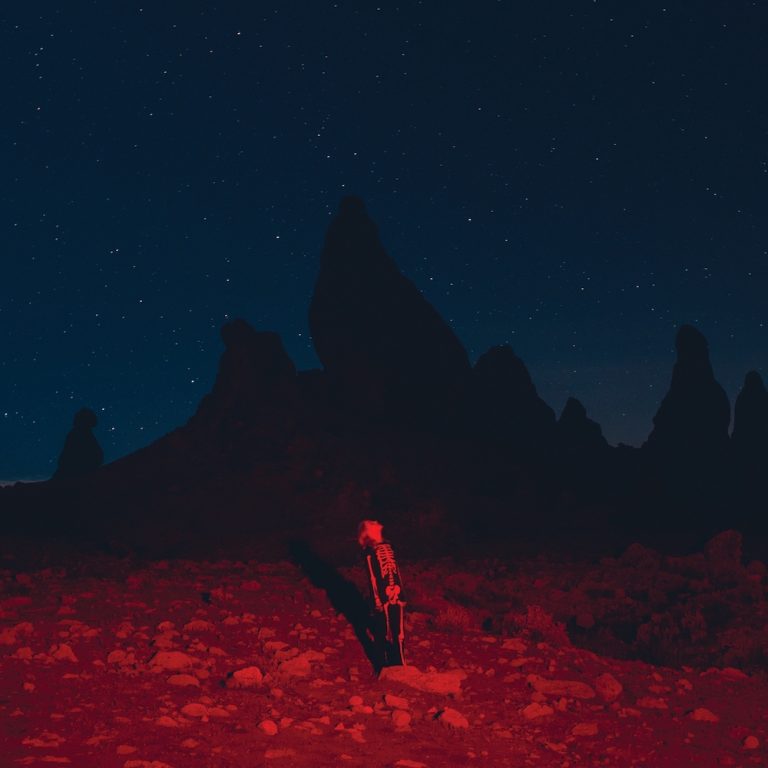It’s hard to believe that when Phoebe Bridgers released her debut album Stranger in the Alps less than three years ago, she was pretty much unheard of. In the intervening time she has formed two ‘super groups’, guested on albums by the likes of The 1975 and Hayley Williams, and amassed a cult following that has elevated her to minor celebrity status – on Twitter, at least. We reasonably could have expected all of those factors to influence her second album, and while all of her boygenius and Better Oblivion Community Center collaborators do make appearances, Punisher is very much the sound of Bridgers returning to her own idiosyncratic world.
The album is named Punisher in tribute to those fans who come up to her and want to discuss her songs in depth – ‘punishing’ her for having written something so vulnerable and putting it out into the world for everyone to hear. It’s easy to understand why Bridgers finds this tough, as her lyrics already cut right down to the bone – there’s really nothing left to uncover, and any further examination is only likely to bring these searing feelings right back to the fore for the songwriter. This is also the magic of her writing, and why she has gained so many adoring fans; listening to her music feels like slipping into her inner monologue, in all its unfiltered honesty, bringing us as close to any songwriter in recent memory.
The main difference between Stranger in the Alps and Punisher is simply maturation of her writing, which might well have come from working with so many talented songwriters in the last couple of years – but you would never mistake one of Bridgers’ songs for anyone else’s. Being born and raised in Los Angeles certainly plays a part, as her words reflect both the city’s mythos and its falseness, which she uses excellently to drive towards her very particular emotional malaise.
Early single “Garden Song” displays the broad-yet-particular sweep of her viewpoint, as she dreams of living in a house on the hill, skinhead neighbours going missing, and having a doctor feel her liver to gauge her resentment. Another exemplary display of how she interpolates all of her influences into her singular voice is “Punisher”, which tracks her meandering walk through the city, strolling past “the house where you lived with Snow White” and having her conscience imposed upon by the ubiquitous presence of Scientology and news stories about copycat killers. It culminates in her awkwardly remembering a fan interaction – a ‘punisher’ asking “What if I told you I feel like I know you?” – paralysing her usually hyper-active tongue. During these moments – some of Punisher’s most stirring – she is backed only by darkened and skeletal arrangements, leaving space for her emotion and imagery to really glow.
Looking between the scraps of observation and witty asides, it becomes clear that Punisher is a break-up album. Much of it was written during and shortly following the dissolution of her relationship with drummer Marshall Vore, and was borne from a state of anxious insomnia caused by their break down. The midnight atmosphere on songs like “Halloween” and “Moon Song” is made all the more poignant by the understated instrumentation, which gives them a half-remembered, half-dream quality.
Typically for Bridgers, we get taken fearlessly into the heart of the couple’s blow-ups, whether it’s about something as trivial as John Lennon or as heavy as the hinted-at skeletons that they both harbour. Bridgers doesn’t sugar coat their behaviour – “Wake up and start a big fire in a one room apartment / But I’m too tired to have a pissing contest,” she laments on “Savior Complex” – but there’s evidently a deep well of love there too. The complexity of their bond floats to the surface through relived memories on “Halloween”; its strength is tested in the make-up anthem “I See You” (which they co-wrote); and the friendship is ultimately solidified by the fact that Vore plays drums throughout Punisher.
Vore was also the originator of Punisher’s closing track “I Know The End”, which he wrote as another break-up song. Bridgers took over and blew it up, musically and lyrically, morphing it into a doom-laden epic: “Big bolt of lighting hanging low over the coast / Everyone’s convinced it’s a government drone or an alien spaceship.” She calls in the cavalry, with Conor Oberst, Lucy Dacus, Julien Baker joining – as well as the rest of Bright Eyes, Yeah Yeah Yeahs’ Nick Zinner, Tomberlin and others – all piling in with voices, horns, guitar and more for the ultimate farewell. While it’s not as affecting as the stark and raw moments Bridgers’ has made her trademark, it does feel like a well-earned victory lap, a moment for her to show off all she’s achieved in the last few years.
Although it’s undoubtedly disappointing for Bridgers not to get out on tour and share Punisher with people immediately, the forced grounding might have actually come at a perfect time for her; for starters it means she’s finally taking a much-needed break after a meteoric few years. What’s more, she’s been able to make the most of it, playing a ‘world tour’ via livestreams that have seen her performing in her bedroom and bathroom – the very places where these songs germinated, adding extra weight to these deeply personal missives and drawing her fans even closer. By the time she’s on the road again, she’ll be able to play to even bigger crowds than she ever has – but that also means there will be more ‘punishers’ than ever, too. Let’s hope she’s ready.

